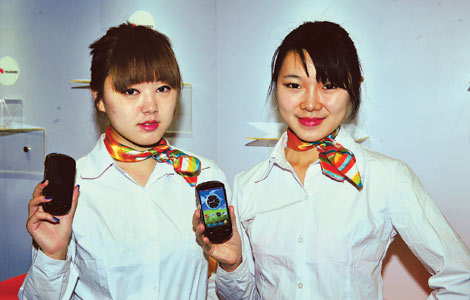Technology
Unicom unveils its Wophone
Updated: 2011-03-01 07:29
By Shen Jingting (China Daily)
|
China Unicom employees show the look of Wophone. The company developed an operating system to challenge Apple's and Google's. Provided to China Daily |
Telecoms carrier premieres domestically developed smartphone operating system
BEIJING - China United Network Communications Group Co, the parent of China Unicom, launched the first domestically developed smart terminal operating system (OS) on Monday.
Officials said Motorola Mobile Holdings, HTC Corp, Samsung Electronics Co, Sony Ericsson Mobile Communications and Dell Inc will launch the first batch of mobile phones using the Wophone OS this year, challenging Google Inc's Android, Apple Inc's iOS and Microsoft Corp's Windows Mobile Phone 7.
The initial screen size for the handsets will be 8 centimeters, although other sizes may become available later. The average price for each phone will be less than 2,500 yuan ($380).
China Unicom said the Wophone OS, which the company developed, is based on the Linux 2.6 system. The Wophone is entirely different from China Mobile's Ophone OS, which is based on the Android system.
In 2009, China Unicom's rival, China Mobile was the world's first telecom carrier to launch an OS for mobile phones. However, the system received a less-than-rapturous reception, and some Chinese media reported that the company had tried to relaunch its original Android 3G phone as a result.
"China Unicom has been affected by the launch of China Mobile's Ophone. When the big brother started research several years ago, the little brother wanted to run after him, or even overtake him," said Chen Jian, a telecom industry analyst with the Beijing-based Citic Securities.
However, he pointed out it will be difficult for China Unicom to take market share from the major international smartphone systems, such as Android, because a successful OS needs continuous investment and a well-established industry chain to support it.
China Unicom has received governmental support in the development of the Wophone since the project began in 2008. A 200-member team works to develop the system and the company has invested about 35 million yuan in the project. An annual fund of 50 million yuan has been established to enable further development, the company said.
Cao Jianlin, a deputy minister at the Ministry of Science and Technology, said the launch of the Wophone OS has broken the monopoly held by foreign companies in smartphone operating systems.
The Wophone OS can support all the different 3G Chinese mobile standards - WCDMA, CDMA2000 and TD-SCDMA - and the 4G standard, LTE. It is can be used with different types of smart terminals, including tablets, TVs and game consoles, according to the company.
Seven Wophone models are scheduled to hit the market this year, with the Beijing Tianyu Communication Equipment Co planning to produce and sell the first batch this month.
Other mobile phone manufactures including Motorola, Samsung, Huawei, have also developed handsets designed for the Wophone OS.
"Foreign companies want to produce Wophones with us, because it is a win-win situation," said Yu Yingtao, the general manager of China Unicom's marketing and sales department.
He said the company has a powerful domestic sales channel, which is a great attraction for international manufacturers.
Yu also said the Wophone is the most important mobile terminal for China Unicom this year, so the handsets will be accompanied by the company's best subsidy package, although the specifics have yet to be announced.
China Daily
(China Daily 03/01/2011 page15)
E-paper

Lingua franca
Chinese are learning English on a scale never seen before and the business of teaching is booming.
Preview of the coming issue
Golden run ahead
Looking abroad
Specials

NPC & CPPCC sessions
Lawmakers and political advisers gather in Beijing to discuss major issues.

Sentimental journey
Prince William and Kate Middleton returned to the place where they met and fell in love.

Rent your own island
Zhejiang Province charts plans to lease coastal islands for private investments

